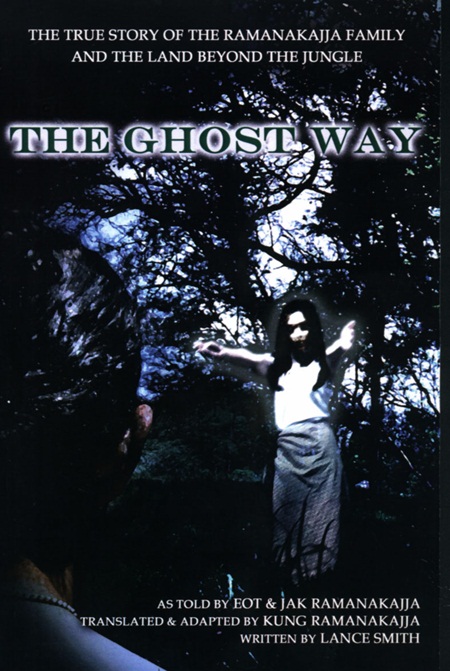This book owes its existence to a large number of people. The Ghost Way (ISBN 978-1453-7682-0-4, November 2010, Create Space publishing) was related by Eot and Jak Ramanakajja, then translated and adapted by their daughter Kung Ramanakajja and then finally written by Kung’s husband Lance Smith.
It is a slim volume, but as I got into it, I was wishing for more, the story being so fascinating.

The tale of the supernatural begins with the hardworking Jak Ramanakajja and his wife Eot, who buy a plot of land, with a house on it, from a money lender who had repossessed the property for non-payment of the debts. The previous incumbent then threatens violence and finally tries to have their contract revoked through the local village council, but is unsuccessful, despite his uncle being the village headman. A rare failure of Thai nepotism!
After a period of time, the Ramanakajja family finds that their house is being visited by spirits, and not friendly ones at that. One in particular appears as the ghostly torso of a woman, a sight very well known in Thai mythology. (You will find one in the Pattaya Ripley’s museum.)
The village life is well described in this book. There is a certain simplicity in that era and environment which is rapidly being lost today. Perhaps we should blame Facebook – it gets blamed for everything else. However, the universal antidote for such supernatural events in the villages is the cleansing rites performed by the monks. Unfortunately, this procedure is not enough and the ghostly torso is soon joined by other decidedly evil spirits.
The Ramanakajja family then try the next proffered method of exorcism, done by a self-appointed local seer and neer-do-well. This too is unsuccessful and the family is forced to trek to the Eot’s parents on some nights, when the hauntings become too grotesque and omnipresent, making sleep impossible.
An “explanation”, if that is truly possible, is given describing the highwaymen who used to rob the passersby and were hunted down and shot. Surrender was not an option (in many ways similar to the ‘war on drugs’ extra-judicial killings of a previous government) and the bodies were laid out to be ridiculed by the villagers for many days, before the relatives were allowed to claim the body. Those were just some of the tortured souls of evil. Others were known to the villagers as being unfortunates during their earthly tenure.
If you are a believer in ghosts (in Thai “pii”) then this book will hold no qualms for you. If you are not a believer in ghosts, then this book might just shake your preconceptions. And if your wife is Thai, do not let her read it, as she will suffer from sleepless nights for months afterwards.
As a footnote, on the evening I read this book, my Thai wife was out attempting to catch spirits with a camera, after a visiting monk said there was a spirit roaming our village. Even for very well educated Thai women “pii” are not the figment of imagination.
Price? It should be under B. 500.




